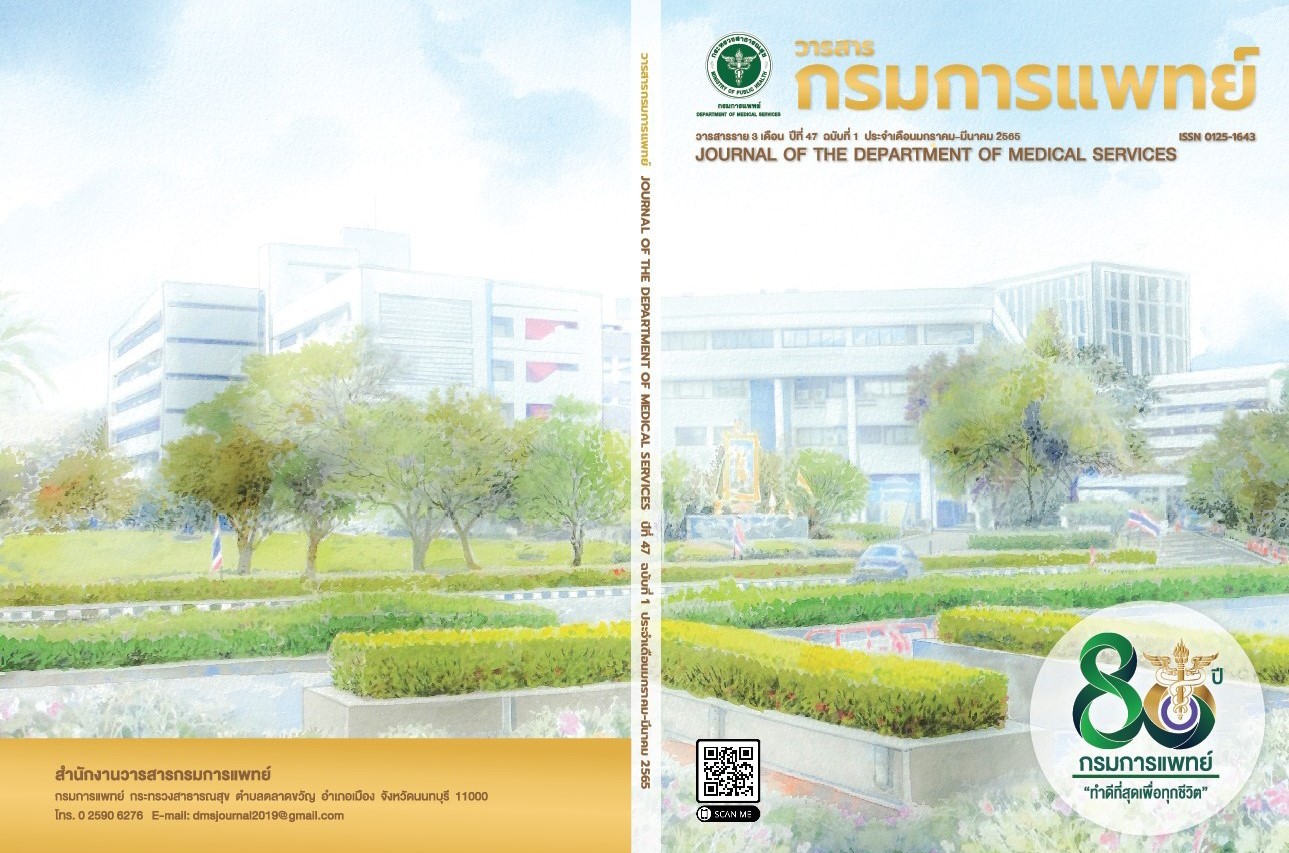Behavioral and Learning Outcomes after treatment of Children with Attention Deficit/Hyperactivity Disorder at Bangchak Hospital, Samut Prakarn Province
Keywords:
attention deficit hyperactivity disorder, school-age children, behavioral therapy, learning disturbanceAbstract
Background:Previously, children with attention deficit hyperactivity disorder (ADHD) at Bangchak Hospital would have to be transferred to a child psychiatrist to be diagnosed and treated. Because of the long appointment waiting times, Bangchak Hospital increased the opportunity by ensuring a pediatrician was available locally to diagnose and treat them.Objective: To study impulsive behavior and learning achievements of children with ADHD after the treatment following Bangchak Hospital ADHD guidelines. Method: This was a retrospective study using descriptive statistics. SNAP-IV questionnaire was applied to study the behavior and parent questionnaire or exam scores was used to study the learning achievements after the treatment of 103 children, aged 6-12, with ADHD who visited Bangchak Hospital from 1 January 2019 to 31 December 2020. They were diagnosed by the pediatrician and treated with methylphenidate (Ritalin) and received the behavioral therapy. Result: After the treatment, their learning achievement increased with a statistical significance (p < 0.001) or 48.5% obtained a better grade. Regarding their behavior evaluation by their parents and teachers, ADHD symptoms decreased with a statistical significance. According to the paired t-test (p<0.001) evaluated by the parents, trouble paying attention behavior decreased to 6.9 on average (95%CI 6.1, 7.7), impulsiveness decreased 6.3 (95%CI 5.3, 7.3), stubbornness and resistance decreased to 3.9 (95%CI 3.0, 4.8). The result evaluated by the teachers was: trouble paying attention behavior decreased to 6.8 on average (95%CI 6.0, 7.7), impulsiveness decreased to 6.6 (95%CI 5.7, 7.5), stubbornness and resistance decreased to 4.2 (95%CI 3.4, 5)Conclusion: The treatment of children with ADHD by pediatrician in Bangchak Hospital using medicines and behavioral treatment can improve learning achievements and behaviors with statistical significance
References
Nigg J, Nikolas M, Burt SA. Measured gene-by-environment interaction in relation to attention-deficit/hyperactivity disorder. Journal American Academy Child Adolescent Psychiatry. 2010:49(9):863-73.
American Psychiatric Association. (2013). Diagnostic and statistical manual of mental disorders (DSM-5®). Washington, D.C, London, England: American Psychiatric Association.
VisanuyothinnT, Pavasuthipaisit C, Wachiradilok P, Arunruang P, Buranasuksakul T. The prevalence of attention deficit/ hyperactivity disorder among primary school students in Bangkok, J Ment Heath Thai.2013 ;21(2) : 66-75
Maddah Z, Ghalenoee M, Mohtashami J, Pourhoseingholi MA, Esmaieli R, Naseri-Salahshour V. The effectiveness of PMT program on parent-child relationship in parents with ADHD children : a randomized trial. Med J Islam Repub Iran. 2018; 32:89
De Meyer H, Beckers T, Tripp G, vander Oord S. Reinforcement contingency learning in children with ADHD; back to the basic of behavior therapy. J Abnorm Child Psychol. 2019;47(12): 1889-1902
Evans Sw, Owens JS, Wymbs BT, Ray AR. Evidence-base psychosocial treatments for children and adolescents with attention deficit/hyperactivity disorder. J Clin Child Adolesc Psychol. 2018;47(2);157-198
Harstad E, Levy S. Attention-deficit/hyperactivity disorder and substance abuse. Pediatrics. 2014;134(1):e293-301.
Kortekaas-Rijlaarsdam AF, Luman M, Sonuga-Barke E, Oosterlaan J. Does methylphenidate improve academic performance? A systematic review and meta-analysis. European Child & Adolescent Psychiatry. 2019;28(2):155-64.
Phongsathirat P, Wachiradilok P. Factors associated with Attention Deficit/Hyperactivity Disorders in school-age children. J Psyc Nurse And Ment Health. 2013;27(1) : 108-120
Pornnopadol C, Attention Deficit Hyperactivity Disorder. Bangkok : Siriraj Academic Affairs Offairs 2020:p41-43
Chongsuksiri P, Apinuntavech S. One-year follow up of parent management training program for children with externalizing behavior problems. J Psych Asso Thailand 2019; 64(2):163-176
Lundahl B, Risser HJ, Lovejoy MC. A Meta-analysis of parent training: Moderators and follow-up effects. Clin Psychol Rev. 2006;26(1):86-104
Suwannasing K, Nukaew O, Nawsuwan K, Hotheem K. The Effect of ADHD Parenting Training Program on Behavior Problems in Children with ADHD. J of Public Health Nursing Sep-Dec 2020;34(3):37-48
Downloads
Published
How to Cite
Issue
Section
License
Copyright (c) 2022 Department of Medical Services, Ministry of Public Health

This work is licensed under a Creative Commons Attribution-NonCommercial-NoDerivatives 4.0 International License.
บทความที่ได้รับการตีพิมพ์เป็นลิขสิทธิ์ของกรมการแพทย์ กระทรวงสาธารณสุข
ข้อความและข้อคิดเห็นต่างๆ เป็นของผู้เขียนบทความ ไม่ใช่ความเห็นของกองบรรณาธิการหรือของวารสารกรมการแพทย์



